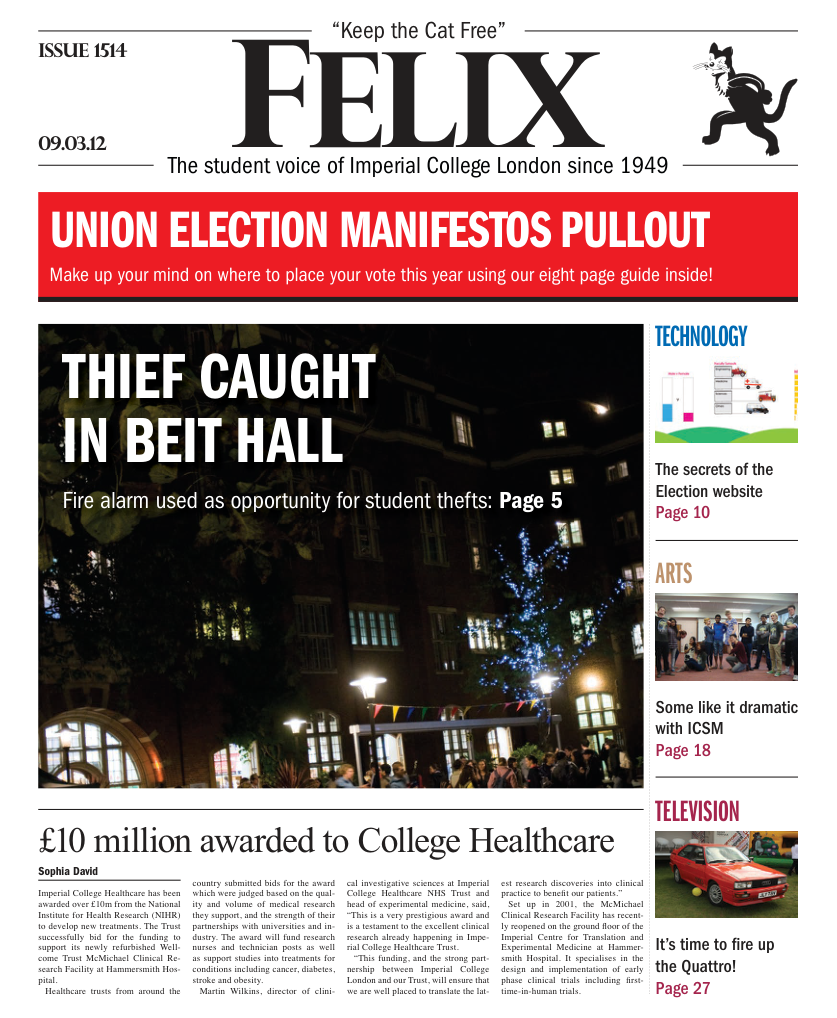Hangman’s dark sense of humour
Steven Abnett courts controversy
February 10th’s edition of Felix managed, in two articles, to highlight the issue of sexism at Imperial College, in two very different ways. One was a straightforward, serious article on the issue of sexism, while the other was the (now infamous) satirical “Hangman Guide to Get Laid”. Not surprisingly, perhaps, the reception enjoyed by these articles has been extremely different. But despite their differences, are the overall viewpoints of the articles really that dissimilar?
The viewpoint of the first article is pretty obvious: sexism exists at Imperial, and it’s bad. It would be pretty hard to argue that sexism isn’t bad, and I’m not going to. An example was given of a group of “lads” classifying women in a lecture by their looks. Such comments are certainly immature and crass, but are they indicative of a deeper prejudice? That’s questionable. It’s probably just an outlet for sexual frustration and a backlash against the large social power that women at Imperial have. While not wanting to make it sound like women, or people in general, are commodities, supply and demand arguments do apply to romantic/sexual opportunities as well, and I’ve heard groups of young women in female-dominated environments making similar comments in the past.
Regarding the Hangman article, I wish to ask a simple question: what is the purpose of humour? The obvious answer is that it exists to make us laugh. But is that all there is to it? I don’t think so. It also exists to challenge and provoke thought on taboos, the establishment and our entrenched notions of society. Often, there is a strong sense of irony, and I would note that an episode of The Simpsons featured a police officer telling road-rage offenders to “Fire a weapon at your TV set, pick a fight with someone weaker than you, or write a threatening letter to a celebrity”. This is obviously ironic satire, just like the Hangman article, but I wonder if those objecting to Hangman also want to see The Simpsons banned. Given its popularity, I doubt it.
...the Hangman article has succeeded in its satirical purpose by making people think about the issue
In the case of black humour, humour acts as an emotional release: it serves as a coping mechanism to dampen negative emotions to a horrible situation by trying to see a bright side, however absurd. This is probably why people who deal with these issues every day (soldiers, police, undertakers, doctors etc.) are widely regarded as having a dark sense of humour. If anything, by dampening negative emotions, black humour actually makes it easier to talk about issues such as rape, and I’ve often found that people with such a sense of humour are more likely to be willing to discuss such issues seriously rather than burying their heads in the sand and pretending that everything is okay with the world.
Given the purpose of satire and black humour, I would therefore argue that no topic should be off-limits, as long as it is handled correctly. So what about the controversial Hangman article? The criticism that it has received seems to be based on the article’s perceived trivialisation and encouragement of rape and the objectification of women. Was that really its intention? The article described rohypnol as “anything but nice” and took a generally abusive tone to the would-be rapists that it was supposedly instructing, suggesting quite the opposite.
Indeed, the only part of the article that even comes close to promoting the use of rohypnol is its description as “the perfect mixer … for some girl who is probably just using you for free drinks”, and this is such a warped and absurd description that I struggle to see how anyone with half a brain could believe that it is meant to encourage such behaviour, particularly given the content of the rest of the article. Quite rightly, the article portrays the attacker as a “waste of oxygen” and the victim as just that – a victim, while highlighting and laughing at the absurdity of any justification that a rapist might try to use.
If anything, the Hangman article has succeeded in its satirical purpose by making people think about the issue and reminding us that yes, unfortunately there are people in existence who think that rape is trivial or acceptable, and that these people are among the worst in society. However, I don’t think that the writer(s) of the article is/are among them. Overall, the two articles are both against sexism and objectification, one expressing this via argument and one via satirical black humour, so the different reception they received is largely unjustified.
Disclaimer: Just to make it clear that there are no vested interests at work here, I have no involvement with the Hangman section, and this is the first piece I’ve ever written for Felix. Therefore, please send all your Hangman hate-mail to the usual address.







